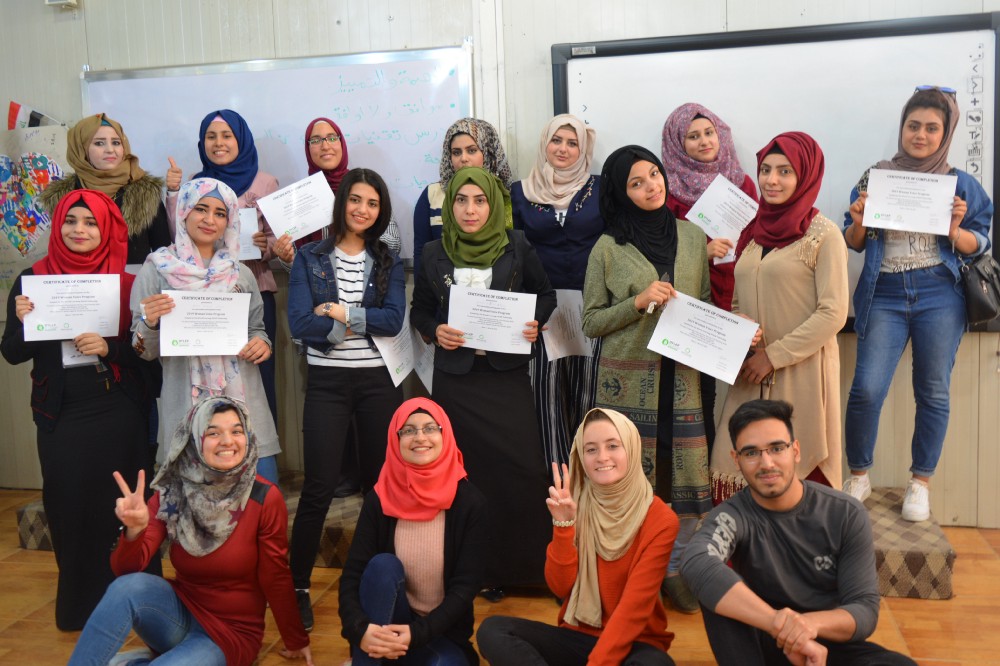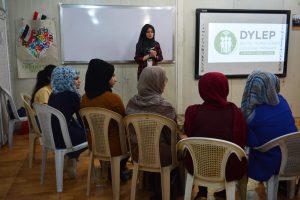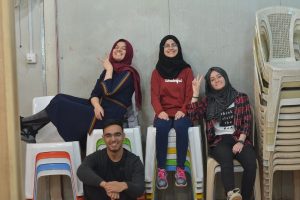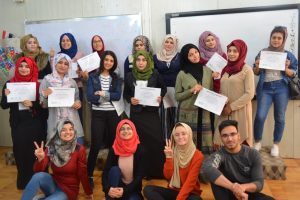-
What We Do
- WHERE WE WORK
-
About Us
 Welcome Message from Carol Jenkins
Welcome Message from Carol JenkinsFor more than 90 years, World Learning has equipped individuals and institutions to address the world’s most pressing problems. We believe that, working together with our partners, we can change this world for the better.
On my travels, I’ve had the opportunity to meet with many of those who have joined us in this mission. In Baghdad, we’ve trained more than 2,300 Iraqi youth who are already giving back at home. In London, our partners in the TAAP Initiative strongly believe that we are all responsible to practice inclusion. And in Vermont, our Experiment in International Living and School for International Training participants prove every day that they have the tools and the determination to change the world.
Please join us in our pursuit of a more peaceful and just world.
- Get Involved
Media Center > Story
In Iraq, This High School Student is Empowering Women to Speak Out Against Sexism
June 14, 2019

Fatimah Fadhil was always passionate about women’s rights, but it wasn’t until she experienced an assault that she realized how badly the problem needed to be addressed in her community of Hilla, Iraq.
Last year, Fadhil, a current high school senior, was shopping with her sister-in-law when she was groped by an unfamiliar man. She was shocked by the experience, but what really impacted her was the reaction of others. “I really wanted to scream at him and show him that he cannot do these things, but I was stopped and told that women are not supposed to talk about these things,” she says. “They’re not supposed to talk back because it’s shameful.”
Wanting to prevent this from happening to other women in her community, Fadhil asked herself, “Where is the woman’s voice in my community?” This question inspired her to form the Woman’s Voice Project, a program funded by the Digital Young Leaders Exchange Program (DYLEP) Fellowship.

Fadhil is one of more than 300 alumni of World Learning’s DYLEP, now called The Experiment Digital, a virtual exchange program for high school students in Iraq and the U.S. to develop their leadership skills, interest in civic engagement, and respect for diversity.
In December, the DYLEP fellowship, sponsored by the the Putnam Foundation, and World Learning board member Rosamond Delori, awarded grants to alumni-led community action projects that are innovative, sustainable, and foster mutual understanding among people of diverse backgrounds.
For Fadhil, the timing of the fellowship seemed perfect. “The DYLEP fellowship was right in front of me, so I felt like I should really do something about [sexual assault],” she says. Wasting no time, she connected with two fellow DYLEP alumni and a local women’s rights activist to create the project.
The Woman’s Voice Project launched in March 2019, consisting of five weekly sessions for young women around Hilla to participate in self-defense lessons, leadership development workshops, and group discussions about women’s issues and empowerment strategies. For this round of the program, the team recruited 32 women, all between the ages of 15–26, to attend the workshops.

Fadhil and her team planned and led the sessions, drawing on their individual expertise in different subjects. Fadhil led the self-defense lessons, having taken them in the past herself. “We really helped a lot of girls learn the basics of self-defense,” she says. Others on the team led role playing scenarios, in which participants act out how they can best respond to being harassed or assaulted, and activities aimed at improving participants’ mental health.
Like any project on this scale, the experience was not without its challenges. The biggest, according to Fadhil, was simply getting the project started. “I had never led a project before, so that was my first challenge — how am I going to do this?” she says. The team also had to rearrange the timeline for the workshops repeatedly to accommodate everyone’s schedules.
Fadhil felt equipped to adapt to these challenges, though, thanks in part to the skills she developed during DYLEP. As a DYLEP participant, Fadhil learned project planning tools such as time management, monitoring and evaluation, and how to lead a team effectively. She tapped into these skills throughout the project and incorporated several DYLEP activities into her program as well.
Still, going into the project, Fadhil was unsure of the impact it could have. “I thought it would be impossible to change peoples’ minds,” she says.

Yet the Woman’s Voice Project turned out to be a great success, achieving the team’s basic objectives — and more. “I heard a lot of positive reviews, and some people said they were profoundly affected by the program,” Fadhil says. Participants, some of whom were single mothers, took the opportunity to open up about their experiences with discrimination and harassment for the first time. As Fadhil recalls, one participant even credited the program with helping to pull her out of a depression that had prevented her from leaving her house for three months after her divorce. “The program gave her hope,” Fadhil says.
Although the first round of workshops has concluded, the effects of the project are still rippling through Fadhil’s community. “It never really ended,” she says. In fact, two participants have already begun similar work in the community, including teaching self-defense to elementary school kids and starting a girl’s club focused on countering sexism.
Fadhil and her team have already started planning for a second round of workshops in 2020. They are hosting a fundraising event in August and are working with local shops and a library to provide free space and discounted supplies for next year. Fadhil is looking forward to seeing where the program goes. “Now I think that it’s really possible to make women feel their value in our community,” she says.
If you are interested in contributing to the Woman’s Voice Project, email Fatimah Fadhil at [email protected].
Written by Lydia Grossman, Program Associate, Global Exchange
DYLEP, now The Experiment Digital, is supported by the Stevens Initiative, which is sponsored by the U.S, Department of State and administered by the Aspen Institute.





